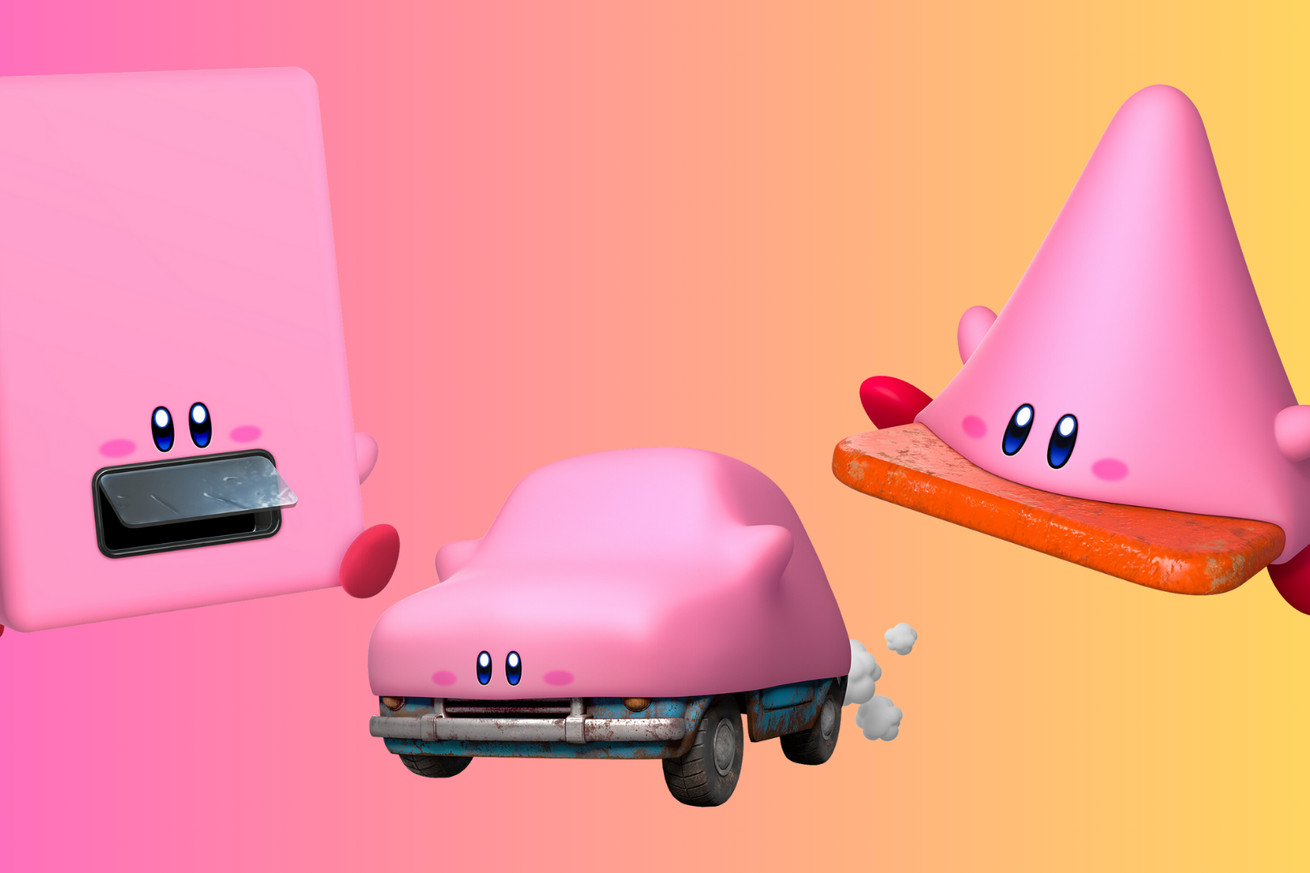
The shape of Kirby
The line for the “Many Dimensions of Kirby” panel at GDC was so long that it stretched from the doors of the conference room, wrapped around the third floor of the main hall of the Moscone Center, and continued out onto the roof. The presentation was given by Kirby’s stepdads, general director for the Kirby franchise Shinya Kumazaki and director of Kirby and the Forgotten Land Tatsuya Kamiyama. It covered the design challenges the team at HAL Laboratory faced trying to make 3D action Kirby games. But more than that, the presentation and my subsequent chat with the two directors afterward revealed a bit of insight into the mind and ethos of Kirby:
You are what you eat.
Kirby is a bright pink amorphous blob, and the developers really leaned into his malleability for Kirby and the Forgotten Land with its new mouthful mode, which lets Kirby swallow everyday objects to take on their shapes and properties. But having Kirby swallow anything and everything to explore the world in Forgotten Land wasn’t what the developers originally had in mind for him.
“Because Kirby can mouthful anything, it seems like there might not be any standards or rules about what could be held within Kirby’s mouth,” said Kumazaki through a translator. “But there are.”
Kumazaki talked about how, in developing mouthful mode, there was an idea that Kirby could swallow an airplane and use it to fly. “If Kirby were to swallow an airplane, he’s got wings and can fly around, I almost feel like there’s probably a 3D game out there that does this,” he said.
Rather than coming up with powers Kirby gets when he swallows objects in mouthful mode, the developers instead focused more on the shapes Kirby can make when he swallows things and what those shapes might allow him to do.
“But rather than swallowing an airplane, maybe Kirby can swallow something that’s in the arch shape and then use the shape of his body to take on wind and that’s how he flies,” Kumazaki said. “To see what he can do with that shape, I think that’s something truly unique to a Kirby game.”
There are other rules about what and how Kirby swallows.
“Something that we considered when we were doing this was what parts of Kirby do we need to stretch to maintain Kirby’s cuteness and what parts could we not stretch because it makes Kirby not as cute,” Kumazaki said.
“To see what he can do with that shape, I think that’s something truly unique to a Kirby game.”
The team didn’t want to stretch the distance between Kirby’s mouth and eyes because it makes him look too different. They also don’t like stretching the distance between his eyes because that cuteness quickly becomes quite scary. In mouthful mode, Kirby can swallow things like construction cones, scaffolding, and vending machines. But there is a special shape of Kirby that’s Kumazaki’s favorite.
“My favorite mouthful mode object is the circle one, because you can take on wind and move around. But I also really like the fact that it looks like an ‘O’ and if you go to the hotel, complete the sign, and spell out ‘hotel’ you’re rewarded for it.”
For effect, as the translator relayed his answer, Kumazaki made a funny “O” shape with his mouth, like a goldfish in an aquarium. Like his character, Kumazaki can be just as cute.
But Kirby’s pink blobby body is more than a means to take on shapes and powers. Kirby is a mirror, but instead of glass, he uses his stretchy mouth and prodigious stomach to reflect who we are.
“I think if Kirby swallowed me, he’d have bear ears,” Kumazaki said. “And he’d be talking all day and drawing a lot.”
Kamiyama was more reserved in his response. “If Kirby swallowed me, because I’m a little bit tall, he’d probably be a little bit slimmer and a little bit taller. But at the same time, because I don’t like to be in the limelight, I don’t think he’d do a lot.”
“I think if Kirby swallowed me, he’d have bear ears. And he’d be talking all day and drawing a lot.”
There was a moment during the GDC presentation when Kumazaki said that the design ethos of all Kirby games comes back to a central point: to make Kirby the hero.
There was a quite hilarious slide to accompany that declaration featuring a starry-eyed Kirby and a buff-looking pink-haired, blue-eyed man wearing a cape behind him. Looking at the slide, I wondered, is that how Kirby sees himself? Or is that how his creators envision him?
“In terms of that slide,” Kumazaki answered later during the interview, “the hero is what Kirby aspires to be, but at the same time Kirby isn’t really thinking about whether he is a hero or not.”
According to Kumazaki, Kirby is a neutral presence. He’s a pure character, not in terms of the purity and innocence of childhood that Kirby’s bright and happy countenance might portray, but a true tabula rasa.
“If there is a villain,” Kumazaki continues, “Kirby isn’t thinking, ‘I’m going to defeat this villain.’ He’s just really there to match the player’s feeling. It’s probably rare to have a protagonist that doesn’t put out a lot of emotion, but I think that’s what makes Kirby Kirby.”
I like the idea of Kirby being a no thoughts, head empty kind of character not truly governed by a moral sense of right or wrong but doing whatever feels best in the moment. It’s probably why he has no problem swallowing up those cute beyond belief awoofies in Kirby and the Forgotten Land. And we can learn a thing or two from that.
“If it tastes good, it tastes good,” said Kamiyama.

